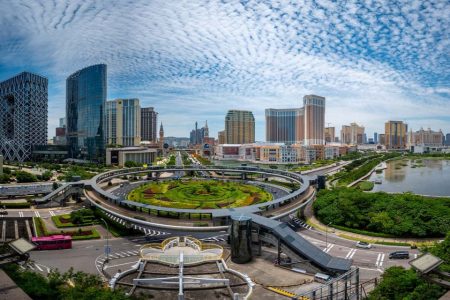A gaming industry amendment bill released by the government this afternoon proposes to reduce the duration of gaming concessions from 20 to 10 years and to cap the number of gaming concessions at six, while prohibiting the granting of sub-concessions and the leasing out of gaming rooms by casino operators.
Details of the bill were revealed by Secretary for Administration and Justice Jose Cheong Weng Chon, who also disclosed that the government does not plan to raise its gross gaming revenue tax rate from the current 35 per cent, which has been in place for over two decades.
The bill aims to amend the Gaming Industry Law which was enacted in 2001.
According to Cheong, the bill proposes that the government can grant up to six gaming concessions by public and open tender for 10 years. The current law allows gaming concessions to last up to 20 years, with the possibility of being extended to up to 25 years.
Cheong also said that sub-concessions will be prohibited by the new law.
Currently, Macao’s gaming industry comprises three concessions (SJM, Galaxy and Wynn) and three sub-concessions (Venetian Macau, Melco and MGM). One each of the sub-concessions was sold by the three concessionaires.
Cheong stressed that the bill has taken into account the views expressed during a public consultation process late last year. After the Executive Council had discussed the bill it was passed to the Macao Legislative Assembly for debate and vote.
The bill must be passed by the legislature in order to become law. Lawmakers’ review of the bill can lead to some changes.
Cheong said the government hoped that the legislature could pass the bill as soon as possible, considering that the three gaming concessions and three sub-concessions expire on 26 June and that the government will need to invite bids to tender for the up to six concessions. However, Cheong added that the tendering process could be postponed if needs be.
According to Cheong, Macao’s future gaming concessionaires will have to hold capital stock of MOP 5 billion. He also said that all casinos must be situated in real estate owned by the concessionaires. Gaming operators’ so-called “satellite casinos” housed in buildings that they don’t own will be given a transition period of three years to regularise their situation, provided that their operators are among the winners of the upcoming bidding process.
Cheong also said the bill proposes that concessionaires’ managing directors must hold at least 15 per cent of their capital stock and be permanent residents. Currently, they only need to hold 10 per cent.
Also,the city’s future gaming concessionaires can only list up to 30 per cent of their shares on the stock exchange.
Cheong said that all bids for the future gaming concessions must meet a range of conditions such as being in line with Macao’s public interest, the national interest and the city’s appropriate economic diversification drive. He said they must also meet the government’s requirements of ensuring the gaming industry’s sustainable development and corporate responsibility.
The policy secretary also said that under the bill the government will be able to strengthen its supervision of the gaming industry, pointing out that casino operators “are not common companies.”
Commentators have pointed out for many years that Macao’s casino permits are not conventional business licences but concessions granted by the government that, to a certain degree, are similar to those granted to public utilities.
Cheong said that all Macao’s current six gaming operators have the chance to win the upcoming tenders. Three of the operators involve US business interests.
The policy secretary also said that under the bill no government representative will sit on the concessionaires’ management boards. The government had initially proposed that possibility during its public consultation process last year. However, he stressed that the gaming concessionaires will have to keep the government regularly posted in detail on any major financial issues.
Cheong said that the government would keep its direct gaming tax rate unchanged at 35 per cent of the concessionaires’ gross gaming revenues. He said the additional payment of 5 per cent of casino operators’ gross gaming revenues as “contributions” (dues) for the government’s social, cultural and other activities would also remain unchanged.
The policy secretary stressed that all the concessionaires’ casinos must be housed on premises that they own, adding that the concessionaires are barred from leasing some of their gaming facilities out to others.
Currently, many so-called VIP rooms for high-stakes gamblers are said to be leased out to junket operators.
Cheong said that the government planned to introduce a separate bill on the tighter supervision of junket operators, whose operations are currently regulated by an administrative regulation (by-law) only.
Cheong also said repeatedly that the bill aims to ensure a “more healthy” development of the gaming industry in line with Macao’s public interest, the national interest and the city’s ongoing efforts to diversify its economy, which continues to be marked by its overdependence on the gaming industry.
Cheong also said the government was determined to control the size of the gaming industry to ensure that it benefits Macao as a whole.
According to the latest available data from the Gaming Inspection and Coordination Bureau, Macao’s gaming industry consists of 42 casinos run by three concessionaires and three sub-concessionaires, with 6,302 gaming tables and 11,449 slot machines, The Macau Post Daily reported.






